This article was co-authored by wikiHow Staff. Our trained team of editors and researchers validate articles for accuracy and comprehensiveness. wikiHow's Content Management Team carefully monitors the work from our editorial staff to ensure that each article is backed by trusted research and meets our high quality standards.
There are 11 references cited in this article, which can be found at the bottom of the page.
The wikiHow Video Team also followed the article's instructions and verified that they work.
This article has been viewed 27,056 times.
Learn more...
Pea protein is a type of protein powder perfect for vegetarians or vegans, and it’s grown in popularity among exercise and dieting enthusiasts. Making a pea protein drink is the most common way to use it, and mixing it is very similar to other protein powders. However, pea protein tends to have an overly earthy taste if it’s mixed with plain water. Luckily, you can use a variety of bases and mixtures to mask that taste if you want to try pea protein for yourself.
Steps
Making a Basic Mixture
-
1Measure out the instructed dosage of the pea protein powder. A common dosing measurement of pea protein powder is 20-25 grams. Products usually come with a measuring spoon to help you take the correct dose. Use this measuring spoon, or a similar measuring tool, and scoop out the instructed amount of powder.[1]
- Always consult the instructions on the product you use. Different brands may have different dosing instructions.
- Don’t eyeball the mixture. Use a measuring spoon and take the exact amount.
-
2Stir half of the powder into a glass of liquid. Breaking up the powder helps prevent the drink from clumping. Pour half of the serving into a glass of water or juice and stir it with a spoon until all the clumps are gone.[2]
- Sometimes shaking helps mix protein powder better than stirring. If it’s still clumping after you stir, try using a sealable container instead and shaking the mixture.
Advertisement -
3Pour the rest of the powder in and mix it. When the mixture settles, add the remaining powder. Stir it like before until all the clumps are gone.[3]
- Pea protein is grittier than other protein powders, so it won’t dissolve completely. If you don’t like that texture, try mixing it into something thicker like a smoothie instead.[4]
-
4Drink the mixture at a normal speed. Chugging the drink might make you nauseous because protein powder is heavy, so take your time. Take some time and finish the drink at a normal speed.[5]
- If the drink starts clumping, stir or shake it some more.
- If your stomach can handle it, you could drink it faster to deal with the taste better.
-
5Take 2 servings per day for a full protein dosage. The daily recommended protein serving is 45-55 grams, so 2 servings of the pea powder should provide that. Drink the mixture twice per day, spaced out by a few hours, for a full day’s serving.[6]
- If you exercise, take one of these doses after your workout to help your muscles recover.
- If the product says to only take 1 serving per day, then follow those instructions instead.
Improving the Taste
-
1Use juice instead of water to mask the pea taste simply. Using plain water doesn’t mask the taste of pea protein much, so if you don’t like the taste, try using your favorite type of juice instead. Mix the powder in the same proportions that you’d use for water, and drink it normally for a better taste.[7]
- Some fruit juices are very high in added sugar, which is bad for your health. Look for a product that’s 100% juice and not from concentrate for a healthier option.
- The pea flavor doesn’t always mix well with tart tastes. Try to avoid berry juices and use something milder like apple juice.
-
2Dilute the powder with more liquid for a weaker taste. If you find the pea protein's taste overpowering but don't want to go through the trouble of making a smoothie to mask it, then diluting it is a simple solution. Add twice as much of your mixing liquid, whether it's water, juice, or milk. Mix in the same amount of protein powder for a weaker and less overwhelming taste.[8]
- This can also work if you're mixing a smoothie and still taste the peas. Try adding 50% more of your base liquid to dilute the taste further. So if you usually use 2 cups (470 ml) of water, make it 3 cups (710 ml) instead.
-
3Whisk the powder into milk for a higher protein dosage. If you’re trying to bulk up, mixing your pea protein with milk instead of water or juice gives more of a protein boost. As an added bonus, the milk adds a richer, creamy flavor that can help cover the pea flavor. Try this option to mask the flavor further.[9]
- Vanilla helps mask the pea taste. Try adding a drop to your milk for a better flavor.
- Whole milk has a stronger flavor than reduced fat varieties, so this is a better option to cover the taste.
- For a vegan option, use almond, soy, cashew, or coconut milk instead.
-
4Make a smoothie with nut ingredients. Smoothies are a great way to take protein powders because they hide any unpleasant tastes and let you mix in lots of other healthy ingredients like fruits and nuts. Nuts and peanut butter are good choices, because they mix well with pea powder and give you an even higher protein serving. Try blending together a smoothie every day and adding a serving of protein powder to get your daily dosage.[10]
- You can choose between water or milk for your smoothie base. Milk is thicker and has a richer flavor, plus adds more protein than water. But it also adds more calories and fat to the smoothie.
- Vanilla also masks pea powder well. Try adding a few drops into your smoothie.
- More tart fruits like berries don’t mix especially well with pea protein. Try using bananas or other more mild fruits to hide the flavor better.
- Limit the amount of sugary ingredients you're adding to your smoothie. You could end up with a drink containing a lot more calories and fat than you intended.
-
5Sprinkle the powder into your morning coffee. You can also give your coffee a boost of protein. Brew and mix your coffee like you normally do. Then, add a few spoonfuls of protein powder and stir thoroughly. Enjoy your coffee with a slightly earthy flavoring and a protein boost.[11]
- You might have to stir your coffee periodically to prevent the powder from settling, especially if you drink the coffee slowly.
- You probably won't be able to mix a full powder serving into your coffee because the cup is too small. But even half of the servings gives you a good protein boost without an unpleasant taste.
-
6Add the powder to a milkshake to completely mask the taste. For an occasional treat, make a protein milkshake instead. Get your favorite milkshake flavor and mix in a dosage of protein powder. Stir it well, then enjoy your protein-packed dessert.[12]
- Both vanilla and chocolate mix well with the pea flavor, so either is a good choice for your milkshake. Berry flavors don't mask the flavor well, so pass on a strawberry shake.
- Remember that milkshakes have a lot of sugar, fat, and calories. Have one occasionally, but don't drink one every day or your health could suffer.
Choosing a Pea Protein Product
-
1Get your pea protein from a licensed health shop or pharmacy. Like many dietary supplements, pea protein powder isn’t always carefully regulated. Many online sellers use subpar ingredients to produce a cheap product. Get your products from a licensed health shop or pharmacy so you know you’re getting the best product possible.[13]
- If you want to investigate a protein powder brand, contact the manufacturer. Ask where the product is made, where the peas are grown, and what the production process is. Reputable manufacturers will readily provide this information, while a less reputable one may give incomplete answers or delay responding. Don’t buy from a manufacturer that won’t answer your questions.
-
2Get a product that’s low in added sugar for a healthier option. Some protein powders have a lot of added sugars. This masks the taste better, but also increases your calorie and sugar intake. If you aren’t careful, you could end up consuming a lot more sugar than you thought you were. Check the nutrition labels on any product you’re considering using. Look for ones that don’t add a lot of sugar for the healthiest option.[14]
- The American Heart Association recommends that women consume no more than 25 g of sugar per day and men should consume a max of 36 g. Use this as your reference to judge whether a product has too much sugar.[15]
-
3Confirm that the product is gluten-free if you have a gluten allergy. Pea protein is naturally gluten-free, but some powders use additives that do contain gluten. Check the ingredients and nutrition label to confirm that any product you use is really gluten free.[16]
Warnings
- Remember to eat a balanced diet in addition to using pea protein. You still need important amino acids, carbs, minerals, and vitamins that don’t come from the powder.⧼thumbs_response⧽
References
- ↑ https://www.foodbusinessnews.net/articles/11344-eliminating-the-pea-flavor-in-pea-protein
- ↑ https://www.menshealth.com/uk/nutrition/a755033/the-8-most-common-protein-shake-mistakes/
- ↑ https://www.menshealth.com/uk/nutrition/a755033/the-8-most-common-protein-shake-mistakes/
- ↑ https://www.aicr.org/resources/blog/health-talk-pea-protein-is-everywhere-is-it-healthy/
- ↑ https://www.aicr.org/resources/blog/health-talk-pea-protein-is-everywhere-is-it-healthy/
- ↑ https://www.health.harvard.edu/blog/how-much-protein-do-you-need-every-day-201506188096
- ↑ https://www.aicr.org/resources/blog/health-talk-pea-protein-is-everywhere-is-it-healthy/
- ↑ https://www.mensjournal.com/food-drink/4-ways-make-protein-shake-taste-better/
- ↑ https://www.aicr.org/resources/blog/health-talk-pea-protein-is-everywhere-is-it-healthy/
- ↑ https://www.foodbusinessnews.net/articles/11344-eliminating-the-pea-flavor-in-pea-protein
- ↑ https://www.insider.com/add-protein-coffee-2018-10#blend-whey-protein-and-coffee-for-a-cappuccino-like-beverage-3
- ↑ https://areyouawellbeing.texashealth.org/pea-protein-need-know-pea-protein-powder/
- ↑ https://www.canr.msu.edu/news/pea-protein-isolate
- ↑ https://www.health.harvard.edu/staying-healthy/the-hidden-dangers-of-protein-powders
- ↑ https://www.heart.org/en/healthy-living/healthy-eating/eat-smart/sugar/how-much-sugar-is-too-much
- ↑ https://health.clevelandclinic.org/7-tips-choosing-best-protein-powder/
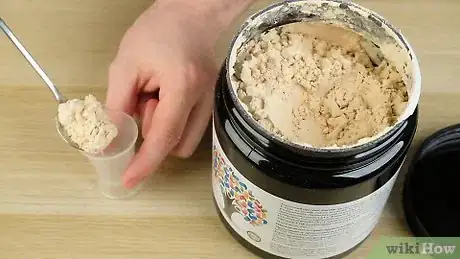
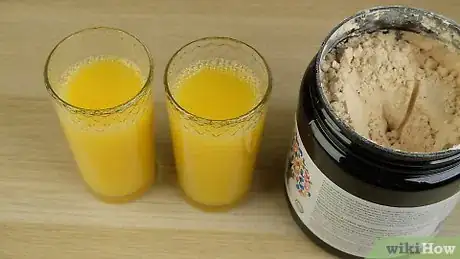
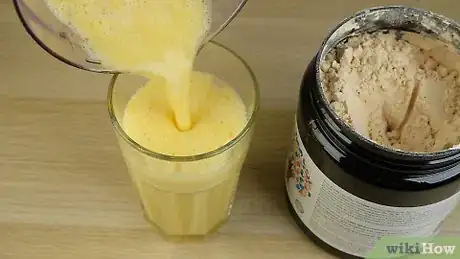
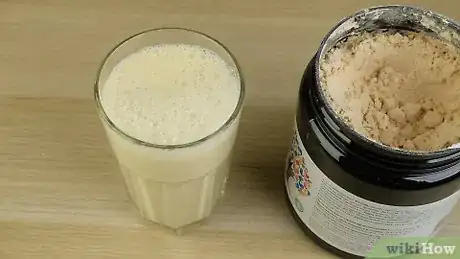
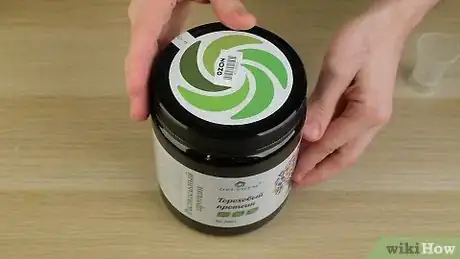
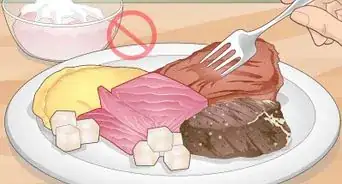



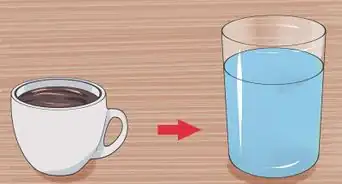













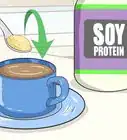





































Medical Disclaimer
The content of this article is not intended to be a substitute for professional medical advice, examination, diagnosis, or treatment. You should always contact your doctor or other qualified healthcare professional before starting, changing, or stopping any kind of health treatment.
Read More...